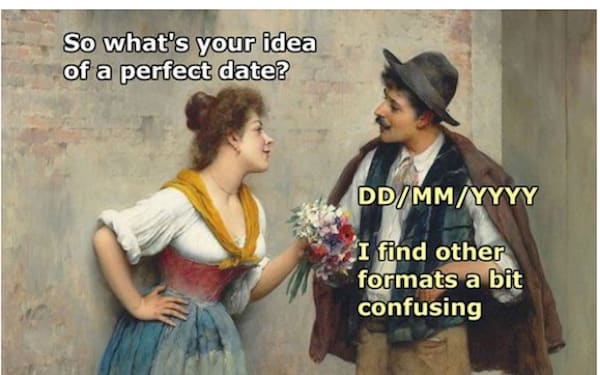When it comes to date formats, there is about 640 million people who prefer to order using MDY, and more than 5000 million that are doing other ordering systems:
https://en.wikipedia.org/wiki/Date_format_by_country
This shouldn't need to be an issue, really. Let's take Python as an example and do a string to date operation both for our MDY friends and for the rest of the world too:
from datetime import datetime
datetime_mdy = datetime.strptime('11/22/1980', '%m/%d/%Y')
datetime_dmy = datetime.strptime('22/11/1980', '%d/%m/%Y')
datetime_ymd = datetime.strptime('1980/11/22', '%Y/%m/%d')
No big issue. All operations output the exact same date. The formatting template is easy to check in https://strftime.org/ and multiple other resources.
Enter Golang:
func main() {
dateMdy, err := time.Parse("01/02/2006", "11/22/1980")
if err != nil {
panic(err)
}
dateDmy, err := time.Parse("02/01/2006", "22/11/1980")
if err != nil {
panic(err)
}
fmt.Println(dateMdy)
fmt.Println(dateDmy)
}
As you see, the parsing introduces a "magic date" which you need to use to refer to the part of the date you need. That magic date is
Mon Jan 2 15:04:05 -0700 MST 2006
You are supposed to remember this, because if you live in the minority of the world that does MDY, then Jan=1, so we can say something like:
01/02 03:04:05 PM '06 -0700
Do you think this is easier? I think it might be for people used to think in MDY, but there is some confusing parts. For instance, Monday is not part of the magic number (1 2 3...) so it's hard to remember how to fit it in. Also, non MDY folks will trip often in the Day vs Month.
Additionally I think this makes the code way less readable. I specially think here it's pretty bad:
time.Parse("01/02/2006", "11/22/1980")
Unless you know Go, you cannot know what is this parsing function doing and how.
This blog post states that this is done like this to avoid context switching, but I have to disagree. I know we also have the format constants, but I don't think is that much more intuitive to discern whether you need RFC850, perhaps RFC1123 or maybe you would be better off using RFC822.
My conclusion is that there are many Go programmers that have created libraries to parse dates in the "old style". That could speak about the usefulness of that system and how people were disappointed with the current official way.
https://github.com/vigneshuvi/GoDateFormat
https://github.com/bykof/gostradamus
https://github.com/takmongwai/go-strftime
Last, this post wouldn't be complete without concluding with this classic meme:








Top comments (2)
The magic date... Wow! The first time I encountered it I was using
Hugothe static site generator and for all I knew, I couldn't understand why my dates were all00001values and the likes. The Python example is perfect for an API that has this level of "dynamics". Having the magic date is a terrible thing inGo. That API takes with it a lot of newcomers into thedebugground.I agree and this is one of the worst Go APIs ever.